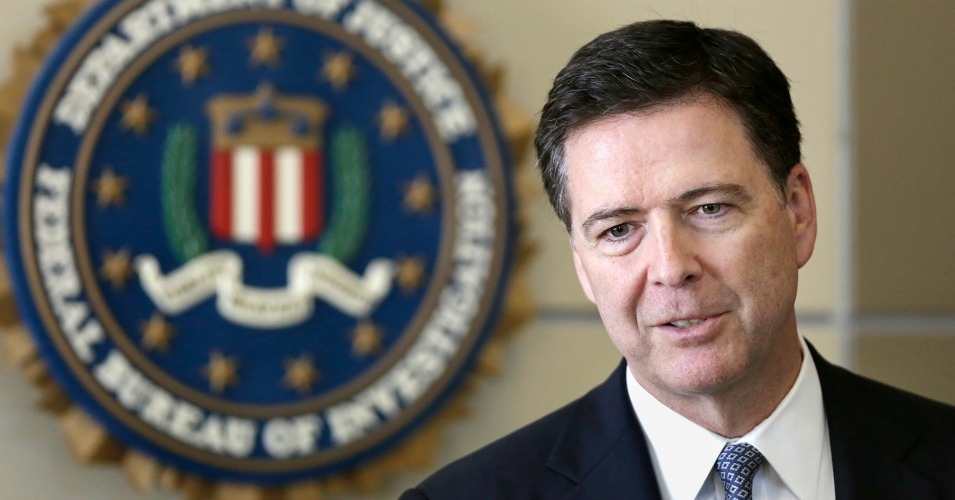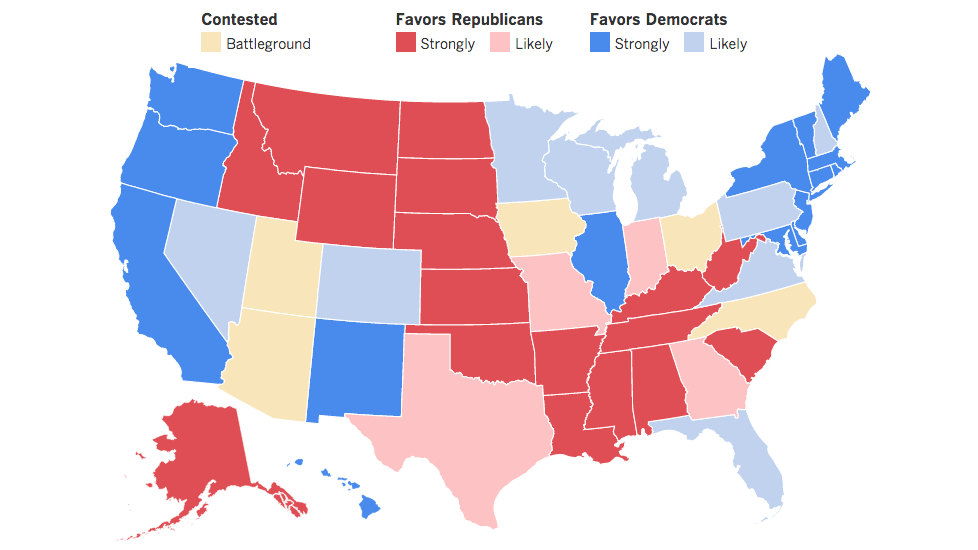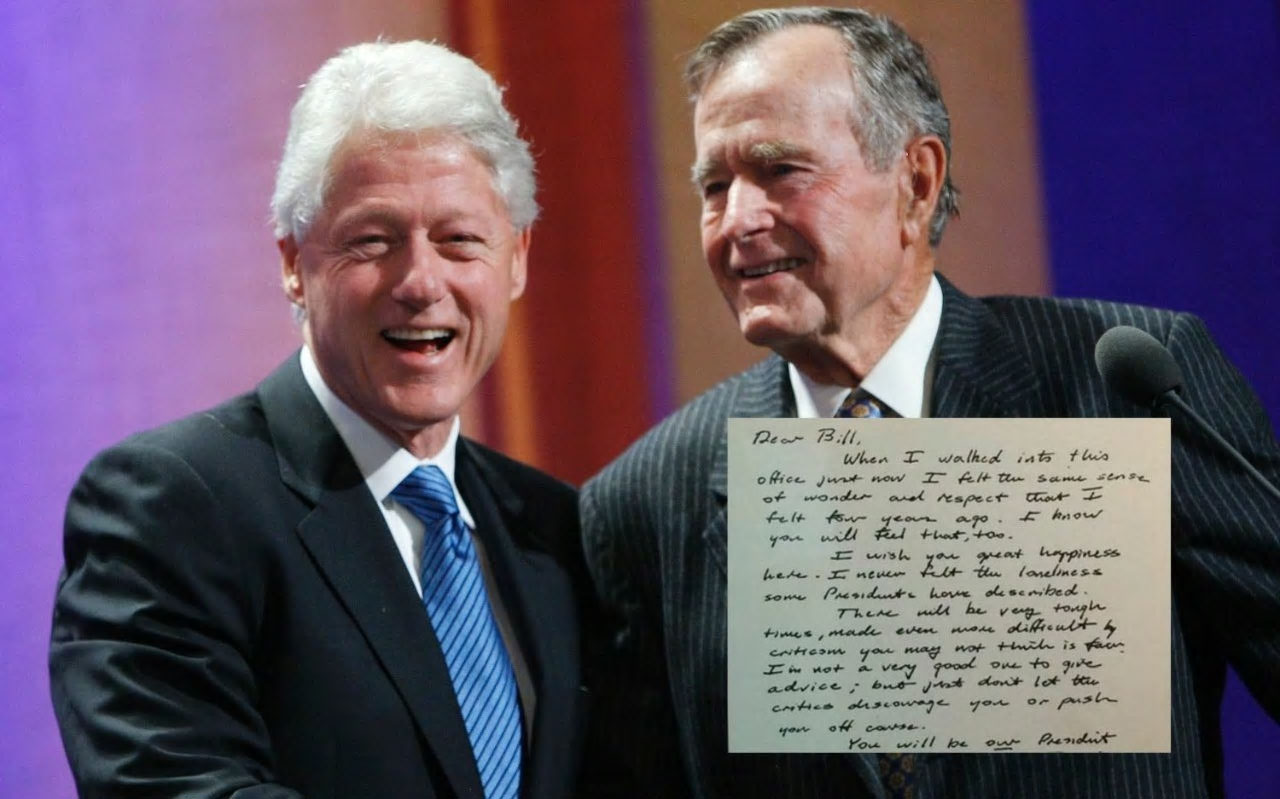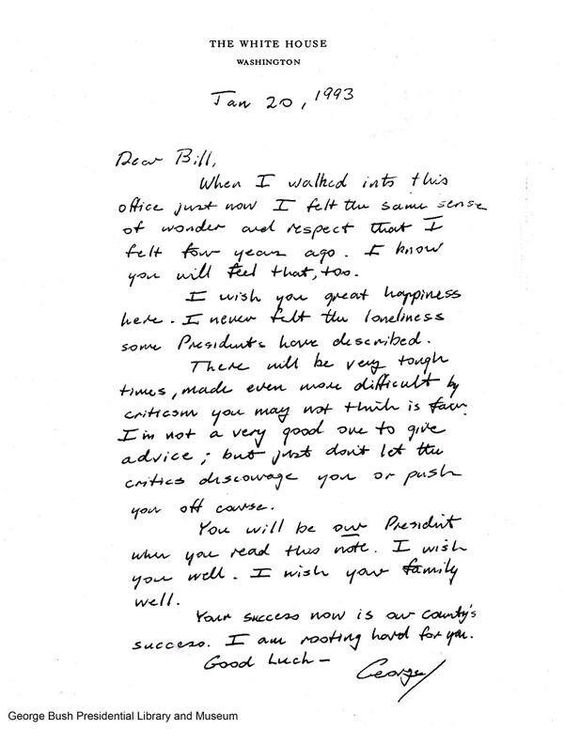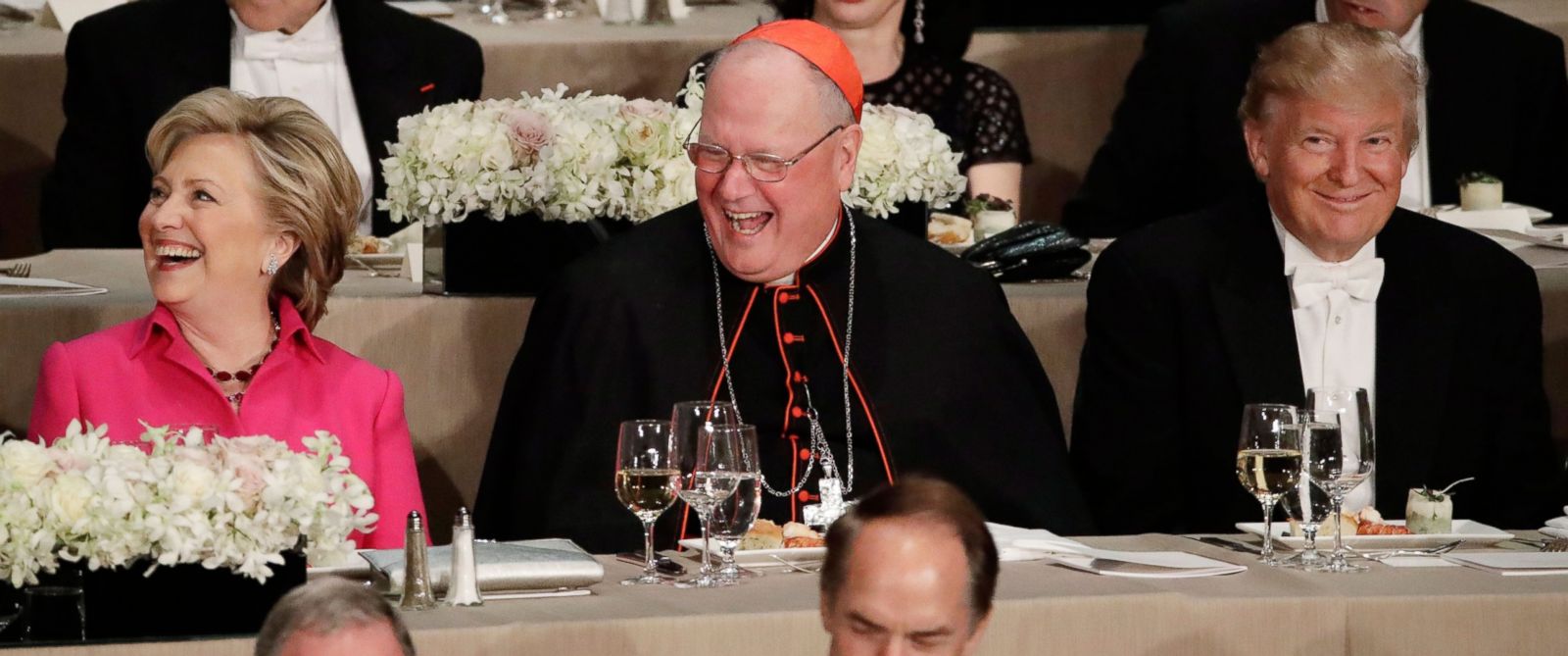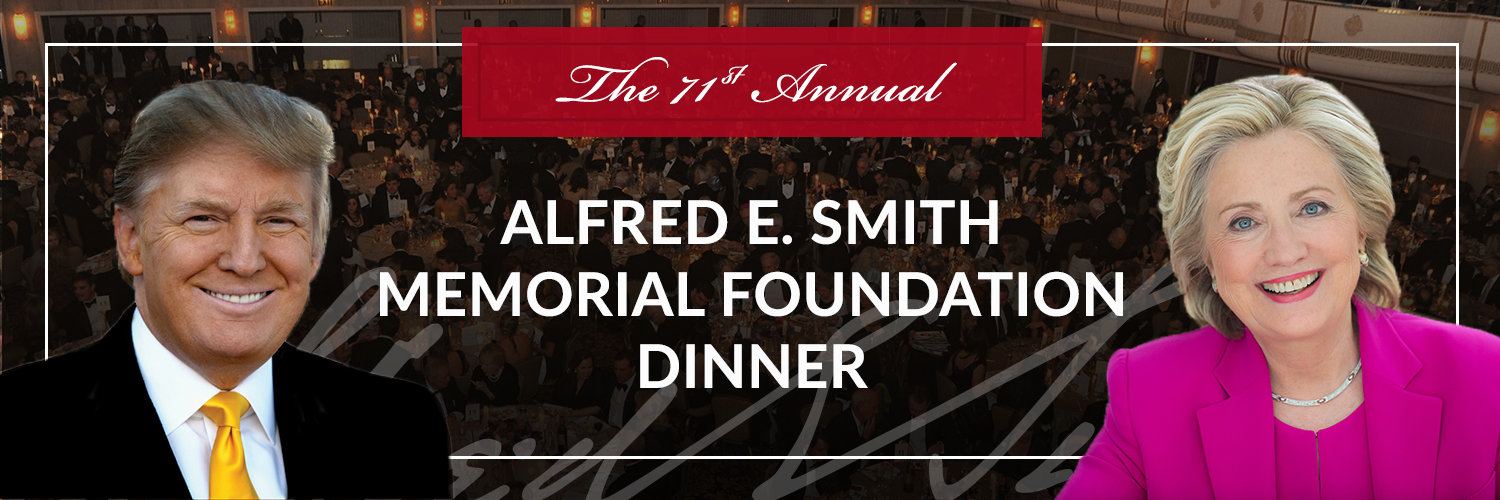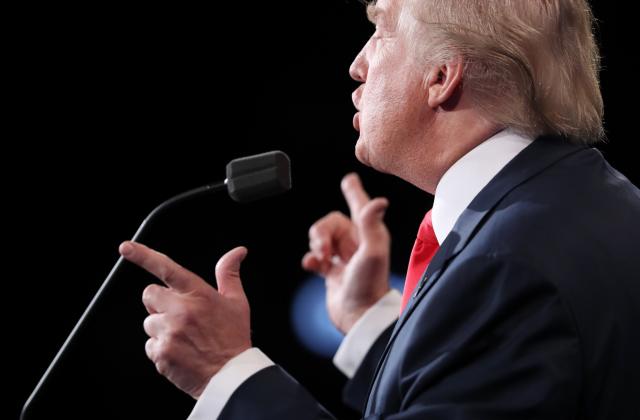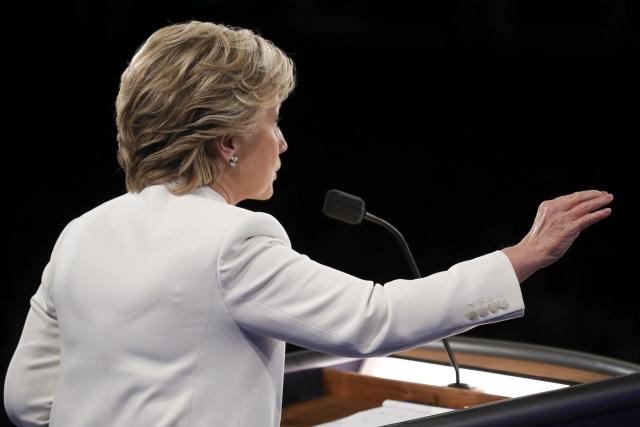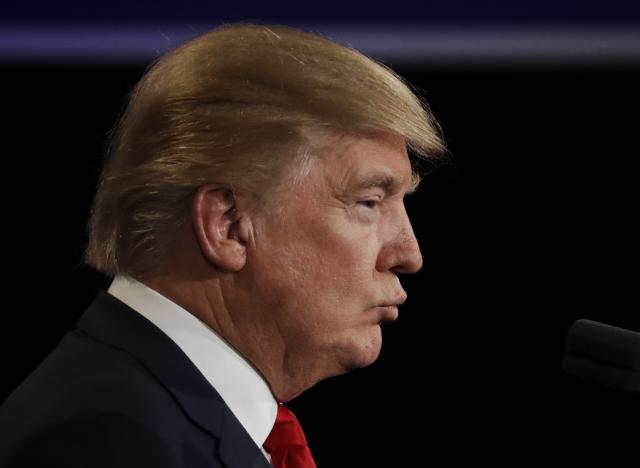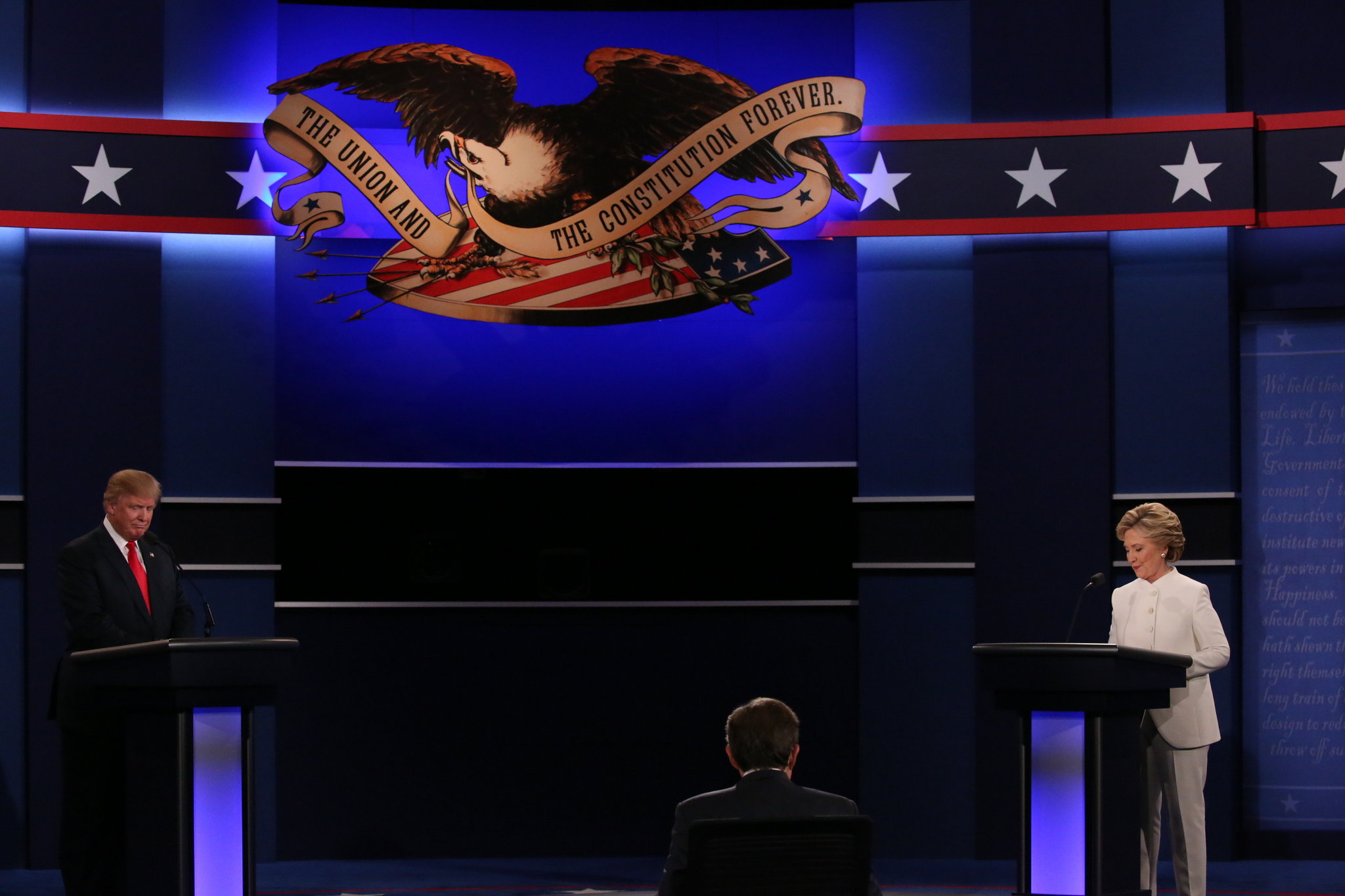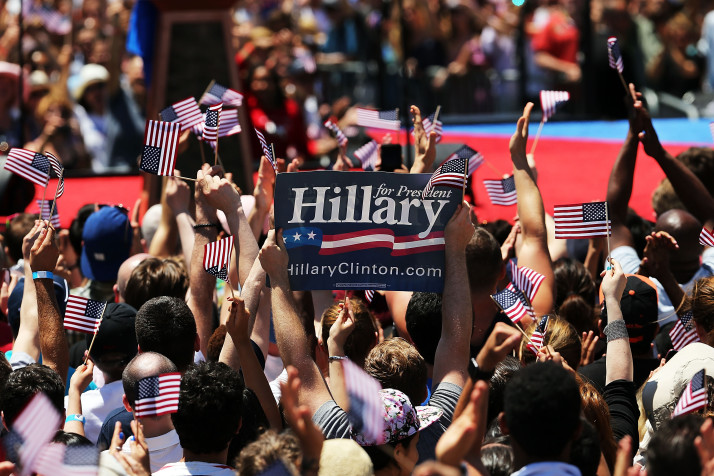
Democratic presidential nominee Hillary Clinton is maintaining a decided advantage in the Electoral College this November, strengthening her grip around states tipping her way while forcing Republican nominee Donald Trump to defend a handful of typical GOP strongholds.
But a narrow path still exists for Trump. Toss-ups in North Carolina and Florida — as well as optimism that states like Pennsylvania and Michigan might tip back into play — leave supporters hopeful.
So ABC News dug through states’ voting history, demographic shifts and head-to-head polling to develop these electoral ratings. ABC News’ puts Clinton at 278 electoral votes and Trump at 198, when including both solid and leaning states, which would give Clinton enough states right now in the solid and lean blue columns to hand her the White House. Sixty-two electoral votes are in toss-up states.
Still, this election cycle has shown that this race can be unpredictable, and Trump has vowed to shake up the traditional map and put several blue states in play. A candidate needs 270 electoral votes to win the White House.
Solid Democratic
Despite Trump’s hopes of putting New York’s 29 electoral votes in play this election, the Empire State would be expected to pull for Clinton, along with other reliably liberal-leaning swaths of the mid-Atlantic. Most of the rest of the historically liberal Northeast would likely remain solidly Democratic in November. In the Midwest, Minnesota and Illinois would likely deliver Clinton a combined 30 electoral votes.
California, which boasts the largest share of electoral votes, at 55, has not voted Republican since George H.W. Bush in 1988. Recent polling there shows Clinton leading Trump by double digits, keeping the Golden State safely in the Democratic column, along with Oregon and Washington. New Mexico is predicted to vote Democratic for the third consecutive presidential election.
Leaning Democratic
More states across the Mountain West and Rust Belt would give Clinton another 75 electoral votes, but Trump is hopeful that he could pick off at least of one them. Colorado voted for Barack Obama in 2008 and 2012, and growing Hispanic populations in both states may keep these states in the blue column for good.
New Hampshire polling has shown the state leaning Hillary Clinton’s way, creating a firewall that blocks any attempt by Trump to cobble together a series of smaller states.
Michigan, Wisconsin and Pennsylvania are usually reliably Democratic states, but Trump’s popularity among working-class whites may put these states in play. A win would be an upset for Trump: Democrats have won every presidential race in Michigan and Pennsylvania since 1992 and Wisconsin since 1988.
Virginia, home to Democratic vice-presidential pick Tim Kaine, is also expected to tip toward Clinton, having voted for Obama in 2008 and 2012. New Hampshire polling also shows a Hillary Clinton advantage there. And polling in Maine, another classic Democratic state, has shown the state’s at-large electoral votes could be up for grabs.
Toss-ups
Four toss-up states, worth 62 electoral votes, could tip the election toward a Clinton blowout, as Trump would likely need to win nearly all those states in order to reach the White House. Toss-up states this year include large electoral vote prizes like North Carolina and Florida, which were decided by just a few percentage points in the 2012 election. Utah and Arizona also have joined the ranks of toss-up states – though Arizona hasn’t gone blue since 1996 and Utah hasn’t gone blue in decades.
Leaning Republican
Ohio will be one of the key states to watch: The Buckeye State has voted for the winner of the White House every year since 1960.
Georgia has voted for the Republican nominee in seven of the last eight presidential elections, but white voters are quickly making up a smaller proportion of active registered voters in the state. White voters made up 68 percent of registered voters in 2004, but they now make up only 58 percent of registered voters, according to data from the Pew Research Center.
Polling in Iowa also shows Trump with a slight advantage there, mostly thanks to an overwhelmingly white electorate. Nebraska’s Second Congressional district, which Obama won in 2008, is also showing signs it could tip Hillary Clinton’s way in 2016.
Solid Republican
The bulk of Trump’s electoral votes would likely come from historically Republican portions of the Great Plains, West and Midwest, as well as the Bible Belt, which stretches from South Carolina to Texas and boasts large numbers of evangelical Christian and social conservative voters.
West Virginia, which has seen unemployment levels rise under Obama, is expected to vote Republican for the fifth presidential election in a row, as is Alaska, which has not voted for a Democrat since Lyndon Johnson in 1964.
Ratings Changes
Nov. 1:
Ohio from Tossup to Leans Republican. Clinton has not held a statistically significant lead in the state in any polling there in nearly two months. Recent polling has shown a tight race. But early voting statistics have shown positive signs for Trump. Ohio does not show early vote by party. But voting is down by almost 80,000 votes in Cuyahoga County compared to 2012 – an Obama stronghold – and turnout is up in Warren County – a key Romney stronghold. Clinton has shifted her efforts and resources to other firewall states like Pennsylvania and Florida, only holding six events there herself during the last two months.
Alaska from Solid Republican to Leans Republican. Alaska has supported the Republican candidate in every presidential election since 1964. Alaska has a historical willingness to vote for third party or unconventional candidates, like its independent governor and Joe Miller over incumbent senator Lisa Murkowski in the 2010 Republican senate primary, then wrote-in Murkowski to victory in the general election. Alaska’s small population also allows for more realistic swings in its preferences.
Maine At-Large from Leans Democratic to Solid Democratic. A recent poll from the Press Herald/UNH showed Hillary Clinton with an 11-point lead there. The state’s second Congressional district remains a toss-up, but we don’t expect a potential Trump victory there to be wide enough to tip the entire state his way.
Oct. 28: Florida from Leans Democratic to Tossup. A new Bloomberg Politics poll out this week shows Trump earning 45 percent support vs. 43 percent for Clinton. Meanwhile, early voting shows the two parties running virtually even in early votes.
Oct. 21: Florida from Tossup to Leans Democratic. Florida has been seen as a must-win for Trump, so this shift makes the Republican nominee’s shrinking path even narrower. The latest Quinnipiac poll out this week shows Clinton leading Trump by 4 points in the Sunshine State, which went for Obama in 2012 and 2008.
Nevada from Tossup to Leans Democratic. The state has voted with the overall winner of the presidential election since 1980 and campaign officials there feel that the state is tipping toward the Democrats.
Utah from Leans Republican to Tossup. Independent candidate Evan McMullin’s rapidly growing popularity in the state, especially among Mormon voters who are defecting from Donald Trump, threatens to siphon votes from the GOP nominee – increasing the odds that Hillary Clinton edges ahead or McMullin wins the state outright.
Arizona from Leans Republican to Tossup. Clinton has put once-reliably red Arizona in play, a state that hasn’t voted for a Democrat since Bill Clinton in 1996. Michelle Obama and Bernie Sanders campaigned there this week in hopes of galvanizing Democratic support, particularly among the state’s growing number of Latino and young voters.
Oct. 14:
There is only one change to the ABC presidential race ratings this week. Utah, which changed in August from “Solid Republican” to “Leans Republican” before returning to “Solid Republican,” is once again being downgraded to “Leans Republican.” Utah’s large religious population expressed dismay over last week’s release of a video clip showing Trump making derogatory comments about women and third party candidates such as Gary Johnson and Evan McMullin could siphon votes away from Trump.
Oct. 7:
ABC News is now rating Maine’s first congressional district for the first time: “Solid Democratic.” While Clinton holds a solid lead in CD-1, the race in the second congressional district is still a “Tossup.” The state’s two electoral at-large votes continue to be rated “Leans Democratic.”
Sept. 2:
ABC News changed New Hampshire from “Tossup” to “Leans Democratic” and Nevada from “Leans Democratic” to “Tossup.” New polling from WMUR/UNH shows Hillary Clinton with a nine-point lead in the Granite State, which hasn’t voted Republican since 2000. And Hillary Clinton’s campaign continues to dump big television advertising dollars into Nevada – second only to Ohio in the most dollars per electoral vote – showing that state very much up for grabs.
Aug. 30:
ABC News changed Maine’s rating from “Solid Democratic” to “Leans Democratic,” the state’s second congressional district from “Leans Democratic” to “Tossup,” and Missouri from “Leans Republican” to “Solid Republican.”
Maine Recent polling in Maine has shown a competitive race. Maine could split its electoral votes for the first time – with two votes going to the state’s overall winner and one to the winner of each of the two Congressional districts. A new poll from Press Herald/UNH shows Clinton and Trump within the margin of error, with Trump leading by 14 percentage points in the state’s more rural second Congressional district. Still, the state hasn’t gone red in 1988.
Missouri While the race for the U.S. Senate remains competitive in Missouri, the presidential race there has tipped back toward Republican nominee Donald Trump. The state has gone blue only twice in the last four decades – both times for Bill Clinton in 1992 and 1996. Still, Mitt Romney won the state by a wide 10 percentage points in 2012 and Clinton’s campaign and super PAC have not invested time or resources there.
Aug. 22:
ABC News changed Iowa from “Tossup” to “Leans Republican” and Utah from “Leans Republican” to “Solid Republican.” It also rated the second Congressional District in Maine as “Leans Democratic” and the second Congressional district in Nebraska as “Leans Republican.”
Aug. 12:
ABC News changed Utah from “Solid Republican” to “Lean Republican” and Virginia from “Tossup” to “Lean Democratic.”
Virginia Recent polling and other changes in the race between Donald Trump and Hillary Clinton show that Virginia, once a tossup state, is leaning Democratic. Virginia, historically a battleground state, last awarded its votes in the Electoral College to a Republican in 2004. For the past four election cycles, Virginia has cast its votes in the Electoral College for the eventual winner of the presidential race. In new NBC/WSJ/Marist poll out today, Clinton’s lead over Trump widened since last month, with 46 percent of voters going for Clinton and only 33 percent saying that they would vote for Trump. Clinton’s recent selection of Tim Kaine as her running mate strengthens her position in Virginia. Kaine, a former governor of Virginia and the state’s current senator, is a popular figure in the Old Dominion. All signs show a state leaning towards voting for a Democrat in the White House once again.
Utah Trump is still favored to win Utah, but it won’t be as easy a lift as previous GOP nominees. Clinton has signaled she wants to play in the state, penning an opinion piece in the Deseret News this week. “Every day, Trump continues to prove he lacks the morals to be our commander-in-chief,” she wrote, appealing to deeply-religious Mormons who make up a crucial voting bloc in Utah. With prominent players like Mitt Romney still sitting on the sidelines, the Libertarian candidate Gary Johnson and new conservative candidacy of former CIA operative Evan McMullin threaten to strip some support from Trump. Still, Utah has voted for a Republican in every presidential election in the last 50 years, including delivering a sweeping 73-25 percent victory for Mitt Romney in 2012.
June 17:
ABC News changed Missouri from “Solid Republican” to “Lean Republican” and Arizona from “Solid Republican” to “Lean Republican.”
♦ Culled from the ABC News’ ( by JOHN KRUZEL and RYAN STRUYK, Noah Fitzgerel, Adam Kelsey and Ben Siegel).

